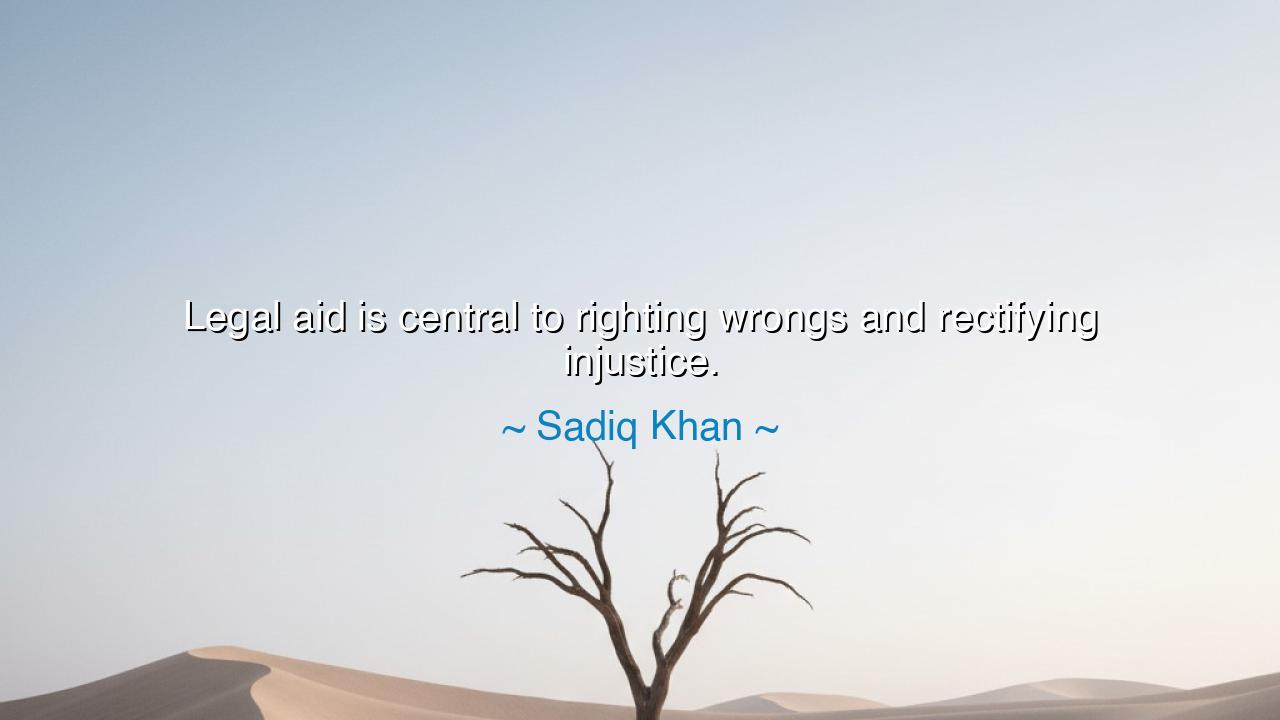
Legal aid is central to righting wrongs and rectifying injustice.






Hear the words of Sadiq Khan, a man shaped by the law and the struggles of ordinary people, who declared: “Legal aid is central to righting wrongs and rectifying injustice.” These words, simple and clear, carry the weight of ages. They speak of the eternal struggle between the powerful and the powerless, between those who have the wealth to summon armies of lawyers, and those who stand alone with nothing but their truth. Without legal aid, the weak would be silenced, and the strong would rule unchecked. With it, even the lowliest may find justice.
For what is legal aid but a lifeline for those who cannot afford to buy the tools of justice? The courtroom is a battlefield, and lawyers are its warriors. To be denied counsel is to be thrust into battle unarmed, to fight with bare hands against shield and sword. The rich may twist the law to their favor, but the poor, without aid, are left defenseless. Thus Khan speaks rightly: if a society claims to love justice, it must ensure that all, rich or poor, have access to its protection.
History itself proclaims this truth. In the days of ancient Athens, even slaves and foreigners could appeal to the courts, for the polis recognized that justice must not belong only to the few. Centuries later, in England, the Magna Carta declared that no man should be denied right or justice, regardless of his station. And in modern times, the Gideon v. Wainwright decision in the United States established that the accused, even if penniless, must be given a lawyer. Each of these moments carries the same conviction: that without aid, the law is not justice, but privilege.
There are also tales of what happens when legal aid is absent. Consider the countless workers exploited in factories, cheated of wages or maimed without compensation. Without counsel, they endured their suffering in silence, powerless against the corporations that crushed them. Yet when advocates and legal aid societies rose to defend them, victories were won: safer working conditions, fair wages, and the recognition of human dignity in labor. Here we see the truth of Khan’s words: legal aid does not merely serve the individual; it transforms the society.
The lesson, then, is clear: justice is not self-executing. It does not fall from the sky like rain. It must be fought for, argued for, and defended in courts of law. If only the wealthy may afford to wage that fight, then justice is chained. But if legal aid exists—robust, funded, and accessible—then even the weakest voice can echo in the halls of power.
Therefore, O listener, guard this principle. Support systems that give the poor access to legal counsel. Do not let leaders erode or dismantle them in the name of saving coin, for every coin saved in this way is bought at the cost of human dignity. And in your own life, remember that justice is not secure until it is secure for all. If you are privileged, lend your strength to those who are not. If you are skilled, use your knowledge to defend the weak.
So let the words of Sadiq Khan echo in your heart: legal aid is central to righting wrongs and rectifying injustice. Without it, law is tyranny cloaked in parchment. With it, law becomes a living covenant, binding rulers and ruled alike to fairness. Treasure it, defend it, and demand it—for it is the shield of the powerless, the voice of the voiceless, and the cornerstone of any society that dares to call itself just.






AAdministratorAdministrator
Welcome, honored guests. Please leave a comment, we will respond soon